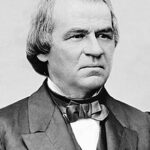The Lenient Reconstruction Decision
President Andrew Johnson implemented Johnson Reconstruction policies that prioritized rapid Southern readmission over civil rights protection. He issued over 13,000 individual pardons to former Confederate leaders and officers. His plan required only loyalty oaths and acceptance of slavery’s abolition. Johnson rejected harsh punishment for rebellion and opposed extensive federal intervention. ⚠️ This approach directly contradicted Radical Republican plans for comprehensive Southern transformation.
Presidential Pardons Program
Johnson’s pardon system restored political rights to former Confederate officials immediately. Wealthy planters could petition directly for presidential clemency. Most applications received approval within months of submission. Former Confederate generals returned to political power across the South. 📊 By 1866, pardoned Confederates controlled most Southern state governments and federal congressional seats.
Weak Federal Enforcement
Johnson refused to deploy federal troops for civil rights enforcement. His administration provided minimal support for Freedmen’s Bureau operations. State governments received broad autonomy to manage post-war reconstruction independently. Johnson Reconstruction policies essentially abandoned four million freed slaves to former masters. 💰 Economic structures remained unchanged, preserving plantation-based labor exploitation through new legal mechanisms.
Impact:
Black Codes and Legal Oppression
Southern states immediately enacted Black Codes restricting African American freedom and mobility. These laws prevented land ownership, limited employment options, and criminalized unemployment. Former slaves faced arrest for “vagrancy” and forced labor sentences. Black Codes effectively recreated slavery through legal loopholes and discriminatory enforcement. 🔥 Violence against African Americans increased dramatically without federal protection or intervention from Johnson’s administration.
Political Consequences
Johnson’s approach triggered fierce congressional opposition and impeachment proceedings in 1868. Radical Republicans gained control of Reconstruction through override votes and constitutional amendments. The 1866 midterm elections delivered crushing defeats for Johnson’s political allies. His lenient policies damaged Republican Party unity for decades. 📉 Presidential authority over post-war reconstruction diminished significantly, shifting power to legislative branch control.
Long-term Social Impact
Johnson Reconstruction policies enabled systematic disenfranchisement lasting until the 1960s Civil Rights Movement. Jim Crow laws built upon his administration’s legal foundations and precedents. Economic inequality between races persisted through sharecropping and tenant farming systems. Educational opportunities for African Americans remained severely limited across the former Confederacy. 🌍 International observers criticized America’s failure to achieve meaningful racial equality after emancipation proclamation promises.
